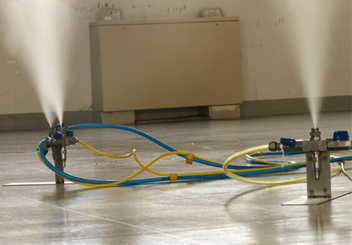Restoring Home Health is First Step in Healing
Everyone knows that mold in our living environments does not go down with a fight. We’ve all heard that you shouldn’t try “killing” mold with RTU (ready to use) sprays from the local store because mold has the unique quality of resisting attacks by, well, shooting millions of spores out into the atmosphere, similar to the quills of a porcupine being hoisted at a predator. I recently had a phone call with a gentleman who had some black looking mold on the wall in one of his rooms, which was then wiped and scrubbed off. Not surprisingly the air quality test that was taken years later using a spore trap revealed the presence of Stachybotrys – the official name for what many call black mold.
Given mold’s resilience, It’s no wonder our bodies have a really hard time fighting it off. Our bodies are quite well suited to heal themselves and to even detox from the various harmful substances and particles that we encounter and ingest. The liver, kidneys, lung, and skin – all execute their detoxing mechanisms. The lymph and intestinal systems do wonders at pulling out and extracting the harmful. Yet, mold often finds a way to wreak havoc on our bodies despite the natural detoxing systems. It seems that the natural antibodies serve as the signal to the mold that it’s under attack and needs to unload even more spores to save itself.
This problem within the body is further amplified when we remember that mold’s most needed substance for reproduction is water. This may be the only instance in which having bodies that are made of nearly 60% water is a potential liability. Some of the most vital organs contain well over the body’s average of water: the brain and heart – 73%; lungs – 83%; muscles and kidneys – 79%.
Water aside, mold only needs two other major ingredients to facilitate growth and reproduction – oxygen and nutrition. And, unless you are not breathing (aka dead), your body is providing a good supply of oxygen to the bloodstream as well as to the most vital organs and systems. In our outdoor environments, nutrition for mold takes the forms of plants and soil. In our homes and facilities mold goes after wood, dust, concrete, sheetrock, and pretty much anything we use to build. In short, It’s not very hard for mold to find nutrition indoors. Within the physical body, mold will not feed on soil or building materials but will attempt to consume anything it can find which typically takes any of the various forms of organic matter native to each of us.
Kind of a grim outlook, right? Well, given these seeming bodily disadvantages when compared to fending off other microbes our bodies still do quite well. However, success is largely contingent on one very important factor. Our bodies must stop ingesting high doses of mold spores and their common mycotoxin companions. Our bodies can continue to use their natural processes to detox and flush and cleanse all day long, but it’s to no avail if our dwelling environments are filled with high counts of mold and mycotoxins. Removing the cause of mold-related health problems and illnesses must be the first step in any remedial therapy, detoxing, and healing. Any healing modality will fall short if the body is continually fighting against a moldy living environment.
There is some good news because this can be remedied. In my experience, there are only two ways to solve the dilemma of living in moldy environments: 1) Move, and 2) Get the mold remediated in such a way that it addresses the whole health of the home. Most of us do not want to move into a different home solely to avoid mold, nor do we want the headaches that accompany such an endeavor. If that’s you, then you’re left with the second option. I was careful in my wording because as intuitive as it sounds it can be easy to focus only on the visible mold colonies that are in a particular part of the house, say the bathroom or basement, and not think in terms of the overall air quality and health of a home. I can’t tell you how many homes I’ve been to where the source of the musty smell cannot even be determined. Perhaps, little drips and spills have accumulated over the years, resulting in an off odor. Perhaps, there was a flood that was not addressed on time, and the mold and the musty smell is now into the carpets and furniture. Or, perhaps, the HVAC units and vents have, over time, collected and are now distributing mold spores throughout the home.
There are other instances, like the situation I had recently in Orem, Utah where the homeowner had hired a mold remediator to rip out and take care of some black mold in her master bathroom. Following the remediation, she continued to wake up around 3 AM every morning with a migraine. She ended up convincing her insurance company to pay for our full house treatment from Pure Maintenance in which we addressed the mold and mycotoxins within every room in the house as well as the HVAC and vents, and the common mold hotspots such as window seals drain, sink overflows, housing for the jacuzzi tub, etc. Last time we talked, about two months following the full house mold treatment, she said the morning migraines had completely stopped within a few days of the treatment and her daytime migraines had been reduced by two-thirds.
Mold and mycotoxins are hard on our bodies. The healing journey can be long and hard, especially if there has been long-term exposure to moldy environments. Fortunately, there is an increasing amount of health practitioners who understand how to address mold-related illnesses throughout the country. We support and cheer these professionals on in their valuable work. The practitioners we work within the Salt Lake and Park City area are adamant about having healthy air to breathe and healthy home environments before even attempting any remedial therapies. In some cases, remediating a home back to healthy levels and thus allowing the body to detox itself is all that’s needed for mold-related health concerns. In other cases, it’s only the first step to better health. Whatever the case, we join with the mold fighting community to continue providing and creating cleaner indoor air for all of us to breathe.
US Army Corps of Engineers Tests Our System

Learn how our unique dry fog system stood up to the rigorous tests put forth by the US Army Corps of Engineers






